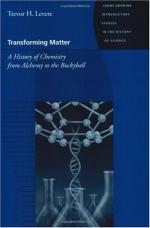|
This section contains 2,642 words (approx. 9 pages at 300 words per page) |

|
The vocable alchemia (or some alternate form such as ars chemica) appears in the West from the twelfth century onward in reference to the medieval quest for a means of transmuting base metals into gold, for a universal cure, and for the "elixir of immortality." The origin of the root chem is not yet satisfactorily explained. In Chinese, Indian, and Greek texts alchemy is referred to as "the Art," or by terms indicating radical and beneficial change, for example, transmutation. Until quite recently, historians of science have studied alchemy as a protochemistry, that is, an embryonic science. Indeed, like the early chemist, the practitioner of "the Art" made use of a laboratory and of certain specific instruments; more important, alchemists were the authors of a number of discoveries that later played roles in the development of the science of chemistry. To quote only a few examples...
|
This section contains 2,642 words (approx. 9 pages at 300 words per page) |

|




